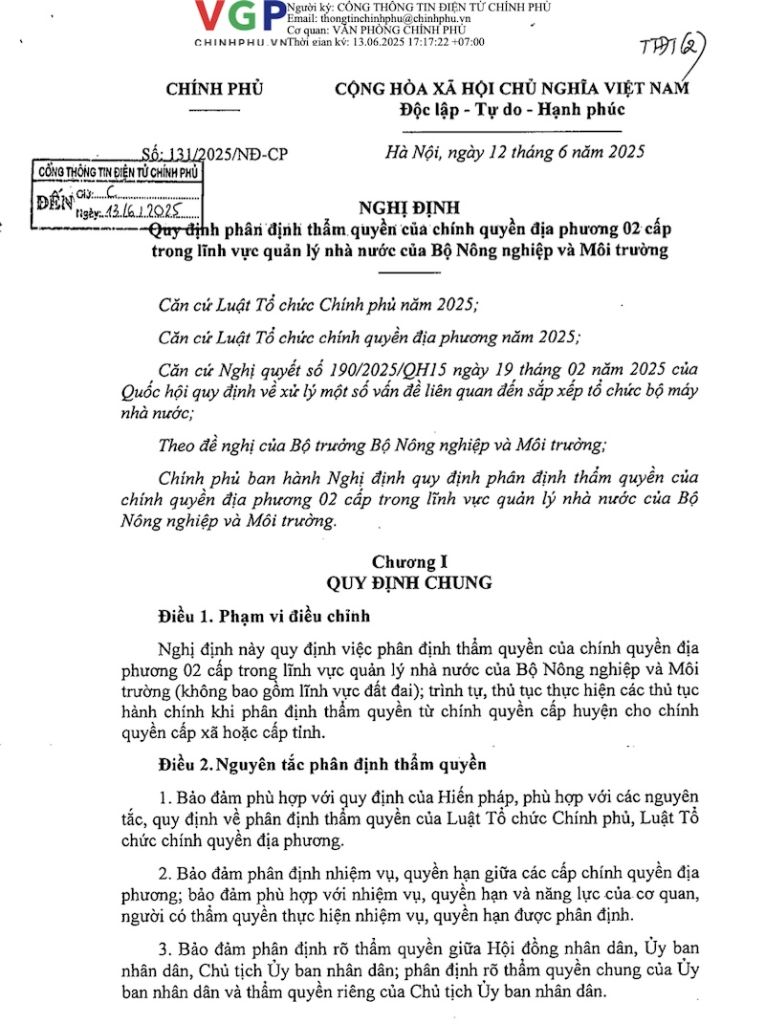From July 1, 2025, the issuance of environmental permits in Vietnam will undergo significant changes under the new regulations of Decree 131/2025/NĐ-CP. This decree not only serves as an important legal foundation for defining the authority between different levels of government but also contributes to simplifying procedures, enhancing transparency, and improving efficiency in environmental management. So, which authority will be responsible for granting environmental permits from this point onward?
Decree 131/2025/NĐ-CP was promulgated by the Government on June 12, 2025 and officially came into effect on July 1, 2025. This decree was developed on a solid legal foundation, including the Law on Organization of the Government 2025, the Law on Organization of Local Authorities 2025, together with the Law on Environmental Protection 2020 and its guiding decrees such as Decree 08/2022/NĐ-CP and Decree 05/2025/NĐ-CP. These provide an important basis for regulating and clearly defining state management authority between different levels of government, including the field of environmental protection.
Decree 131/2025/NĐ-CP clearly distinguishes the authority between provincial People’s Committees (PPCs) and commune-level People’s Committees (CPCs). This decentralization helps specify the responsibilities of each level of government, avoid overlaps, and enhance transparency in management. Provincial People’s Committees focus on projects and facilities of larger scale with higher risks of pollution, while commune-level People’s Committees mainly handle and receive environmental registrations from small facilities generating lower levels of waste.
The principles of decentralization are built on important legal foundations, ensuring compliance with the Constitution and current laws. Accordingly, all tasks and powers assigned to each level of government must be consistent with their actual management capacity, preventing overload or negligence. Furthermore, authority is defined clearly, without overlap among levels and actors such as People’s Councils, People’s Committees, or Chairpersons of People’s Committees, thereby ensuring uniformity and consistency in implementation.
The main goal of decentralization is to simplify administrative procedures, reduce the burden on higher authorities, and increase the autonomy of local governments. With appropriate authority, commune-level governments can promptly handle issues arising at the grassroots level, while provincial-level authorities focus on more complex matters. This approach not only helps save time and costs for businesses and citizens but also brings local government closer to the people in supervising and protecting the environment.

Decree 131/2025/NĐ-CP was promulgated by the Government to regulate and clearly define management authority.
According to Decree 131/2025/NĐ-CP, in combination with the Law on Environmental Protection 2020:
Have the authority to issue, amend, renew, reissue, and revoke environmental permits for projects and facilities with significant pollution risks. Typical cases include:
Do not have authority to issue environmental permits, but are responsible for receiving environmental registrations for small-scale facilities and projects generating waste below the prescribed threshold. This creates favorable conditions for households and small businesses to complete procedures conveniently at the local level.
In certain special cases—such as projects involving national defense and security, or those related to waste import and large-scale hazardous waste treatment—the Ministry of Natural Resources and Environment and relevant ministries (such as the Ministry of National Defense and the Ministry of Public Security) still retain the authority to issue permits.

Authorities with competence to issue environmental permits as of now
It can be seen that Decree 131/2025/NĐ-CP marks an important step in decentralizing the authority for issuing environmental permits, helping reduce the workload for central agencies and strengthening the management role of local governments. Accordingly, provincial People’s Committees are the main authorities responsible for issuing permits, while commune-level People’s Committees handle environmental registrations for small facilities, and the Ministry of Natural Resources and Environment together with relevant ministries retain authority for certain specific cases. This new regulation not only ensures transparency and consistency in state management but also contributes to enhancing the effectiveness of environmental protection in the coming period.